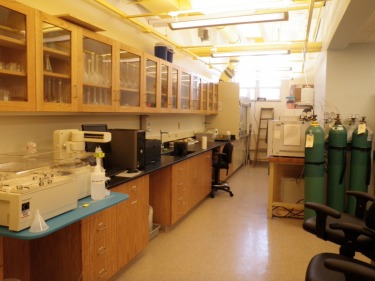Lab Facilities

We have dedicated space in the Earth Sciences Department at Boston University for the Biogeochemistry laboratory. Equipment in this space includes: membrane inlet mass spectrometer system (MIMS) with specially designed inlet system attached to a Balzers quadrupole MS; a Shimadzu GC-2014 (with high sensitivity detectors for CO2, CH4, and N2O; SEAL –Nutrient Autoanalyzer, and a unisense microprofiling system. In addition we have basic biogeochemical equipment including: turner fluorometer, Hach dissolved oxygen, salinity, and pH probes, pH meters, redox meters, centrifuges, analytical balances, muffle furnaces, refrigerators, freezers, and ovens
Both water and soil/sediment samples can be analyzed in this laboratory. Nutrient analysis includes dissolved (NH4+, NO3-, NO2-, Si, DON, DOP) and particulate forms. Gas analyses include N2, Ar, O2, CH4, N2O, CO2, and 15N2.
In 2011/2012 the Fulweiler Lab underwent a major renovation. Our new extended lab includes space for an environmental microbiology laboratory. In addition, we now have our own environmental chamber with temperature and humidity control. This new space greatly enhances our ability to connect biogeochemistry and molecular techniques to better understand the changing world around us. Our new space includes a variety of equipment including: AirClean Systems AC600 Series Combination PCR Workstation with vertical laminar flow air (pre-filter and HEPA filter) and a timed UV light for sterilization; BioRad T100™ Thermal Cycler system which includes 96-well thermal cycler; BioRad Gel DOC EZ System with Image Lab™ software and stain specific sample trays; Promega Quantiflor Handheld fluorometer with two channels (UV and Blue) and a PCR tube adapter. Other equipment includes: Isotemp dry bath incubator, Isotemp water bath, standard submarine gel unit, FisherBiotech electrophoresis power supply, heavy duty vortex mixers, benchtop centrifuge, icemaker, and a Thermo Scientific -80 Freezer, Thermo Scientific Bio-Cane Cryogenic Vessel.
In addition the Earth Sciences department has a laboratory dedicated to the analysis of sediment characteristics. Boston University also has a core stable isotope laboratory that can carry out analyses on a variety of samples for %C and %N as well as stable isotopes.
Both water and soil/sediment samples can be analyzed in this laboratory. Nutrient analysis includes dissolved (NH4+, NO3-, NO2-, Si, DON, DOP) and particulate forms. Gas analyses include N2, Ar, O2, CH4, N2O, CO2, and 15N2.
In 2011/2012 the Fulweiler Lab underwent a major renovation. Our new extended lab includes space for an environmental microbiology laboratory. In addition, we now have our own environmental chamber with temperature and humidity control. This new space greatly enhances our ability to connect biogeochemistry and molecular techniques to better understand the changing world around us. Our new space includes a variety of equipment including: AirClean Systems AC600 Series Combination PCR Workstation with vertical laminar flow air (pre-filter and HEPA filter) and a timed UV light for sterilization; BioRad T100™ Thermal Cycler system which includes 96-well thermal cycler; BioRad Gel DOC EZ System with Image Lab™ software and stain specific sample trays; Promega Quantiflor Handheld fluorometer with two channels (UV and Blue) and a PCR tube adapter. Other equipment includes: Isotemp dry bath incubator, Isotemp water bath, standard submarine gel unit, FisherBiotech electrophoresis power supply, heavy duty vortex mixers, benchtop centrifuge, icemaker, and a Thermo Scientific -80 Freezer, Thermo Scientific Bio-Cane Cryogenic Vessel.
In addition the Earth Sciences department has a laboratory dedicated to the analysis of sediment characteristics. Boston University also has a core stable isotope laboratory that can carry out analyses on a variety of samples for %C and %N as well as stable isotopes.